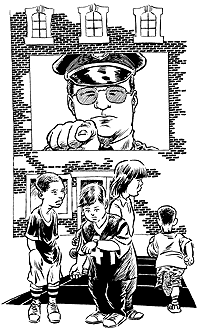Big Brotherly Love
City Council Continues Juvenile Curfew
By Jenny Staff, Fri., Aug. 28, 1998
|
|
Under the curfew ordinance, it is a Class C misdemeanor for persons under the age of 17 to "walk, run, idle, wander, stroll, or aimlessly drive or ride about, or be in the premises of any business" during the hours the curfew is in effect. Violators are subject to a fine of up to $500. Citywide, the curfew extends from 11:30pm to 6am on weeknights, midnight to 6am on weekends, and 9am to 2:30pm on school days. In three neighborhoods, the curfew is even stricter: Kids under 17 have to vacate the downtown entertainment and warehouse districts by 10pm, and the Dove Springs neighborhood by 11pm.
Support for the ordinance among city leaders, law enforcement officials, and residents who credit the curfew for helping clean up their neighborhoods, is virtually unanimous. Gus Peña of East Austin Concerned Hispanics, self-proclaimed "instigator" of the ordinance, said everybody is happy with the curfew, even those affected by it. "Now the kids thank me," said Peña, explaining that some kids want a reason to be off the streets - especially those who may be looking for an escape from gang or criminal activity. The curfew makes it easier for kids to be "where they're supposed to be" after hours: at home asleep, or doing their homework, he said.
The numbers seem to back up Peña's statements. An analysis by city staff demonstrated the ordinance's effectiveness through a litany of statistics showing reduced juvenile arrests in crime categories from theft (down 9%) to auto theft (down 42%) to sexual assault (down 91%). Daytime juvenile arrests have decreased by 14% since the curfew went into effect four years ago.
So it protects kids, protects adults, prevents crime, and encourages borderline delinquents to stay on the straight and narrow - all these things could be true of the curfew ordinance, and it could still be a bad law. Are we getting too used to measures (such as the curfew and the gang injunction) that achieve a desired result at the expense of personal freedom? David Neff, the ordinance's lone detractor last week, spoke in a trembling voice about Austin's "escalating police state," which he says started with park curfews, which apply to adults as well as minors. Looking for a justification for the curfew, Neff asked, "Is [the juvenile crime problem] a police emergency?"
According to the Austin City Council, it is. The curfew resolution passed Thursday states: "The council finds the need to avoid a hiatus in the enforcement of curfews constitutes an emergency. Because of this emergency, this ordinance takes effect immediately on its passage for the immediate preservation of the public peace, health and safety."
Is the curfew a response to a real public safety emergency, or an easy alternative to the intensive parenting and policing needed to keep teenagers out of trouble? Originally justified as a localized solution for high-crime areas, the curfew ordinance was soon extended to the entire city. Similar laws are on the books in most Texas cities, including Dallas, Houston, and San Antonio. And the ounce-of-prevention logic that has made curfews so popular has found new expression in the recently upheld gang ordinance (brought to us by Travis County District Attorney Ronnie Earle), which prohibits some otherwise legal activities by specific individuals suspected of certain crimes.
There's no doubt that Austin faces a lot of public safety challenges following the explosion of its population in the last 10 or so years, or that city leadership must come up with new ways to deal with the new city we've been handed. The implementation of community policing is one example of the effort to do so. The curfew ordinance may be another good way to fight crime, but only if it's commensurate with the level of our crime problems, and not an unnecessary abridgement of the rights of young people. By upholding the city of Dallas' curfew ordinance - which is similar to Austin's - the U.S. Supreme Court has approved the concept of curfews. So unless citizens withdraw their consent, the curfew ordinance will likely remain an option in our leaders' bag of tricks. By staying away from last week's public hearing in droves, city residents seem to have registered their tacit approval - or indifference - for the measure.
This council has shown no signs of enforcing or endorsing martial law for Austin. But with a recent run of successes on issues from managing growth and development to ameliorating race relations, the council needs public scrutiny as much as ever. Its success should not give them space to operate as the (usually) benevolent monarchy of King Kirk and his Court of Six Greens. One encouraging step was Councilmember Bill Spelman's amendment to the curfew ordinance requiring the law be reviewed annually, instead of every three years. It would be nice if the review could be done in more than a cursory, ends-justify-the-means, crime-is-down-so-the curfew-stays, manner. But it won't be if nobody asks for it.
Affirmative Action
An issue that did get a lot more scrutiny last week was the city's affirmative action program. The occasion for the discussion was the approval of a city contract to a company that had failed to meet city goals for subcontracting with women- and minority-owned businesses. The question under debate: How effective is the city's policy, which includes goals but not quotas for women and minority participation in city contracting?
Critics said that the selection of O'Neal Construction to build Austin Energy's St. Elmo Service Center Warehouse showed that the city was not serious about enforcing its M/WBE policy (O'Neal was the only company to bid on the project). A memo from City Manager Jesus Garza and City Financial Director Betty Dunkerley states that although the Small and Minority Business Resources office found that O'Neal did not meet city contracting standards, the best interests of the city would be served by awarding the contract.
Former State Sen. Hector Uribe said that such "best interests of the city" waivers are given too often, undermining the effectiveness of city affirmative action standards: "We need to enforce this ordinance every single day. We should respect the process. Every single time you approve a waiver, you disrespect the process. And you make it that much easier to disrespect the process."
Some city officials, however, warned that overzealous enforcement of affirmative action standards could backfire. "Affirmative action programs are falling all over the country," said one official - mostly due to charges that attempts to include minorities in government contracting are effectively quotas, and therefore unconstitutional. As long as Austin's policies remain goals, and companies need only make a "good faith effort" to meet those goals, the program should remain safe from challenges.
But some questioned whether O'Neal Construction met even the "good faith" standard. After urging from the city - and "the persuasive powers of our staff," according to Jesus Garza - the company increased its estimated level of M/WBE participation. So, if the company could increase its level of compliance under duress from the city, wondered Spelman, does that not indicate they did not make their best effort at securing M/WBE participation the first time around?
Other councilmembers expressed discomfort with the way some contracts are awarded. Councilmember Jackie Goodman cited a "history that's bothersome" in city contracting, and questioned city staff about the possibility of extending bid deadlines in situations where only one bid is received. Explaining her abstention from the vote to approve the O'Neal contract, Councilmember Beverly Griffith noted, "There seems to be a pattern here of acceptance of noncompliance. I wonder if we're sending a mixed message: We really want [minority participation], but if that doesn't work out, we'll fix it on the back end." In the end, however, O'Neal got their contract, with only Griffith's abstention.
The city's contracting practices should come under more sustained attention Sept. 1, when the council plans to reconvene its heretofore disbanded M/WBE subcommittee. Councilmembers Willie Lewis, Gus Garcia, and Spelman will sit on the subcommittee.
This Week in Council: The council is again slated to consider awarding a contract for the operation of the Austin Music Network, and a resolution authorizing negotiations toward establishing a countywide EMS system. Both items were postponed from last week.
Got something to say on the subject? Send a letter to the editor.









